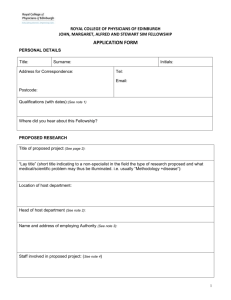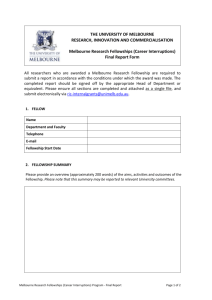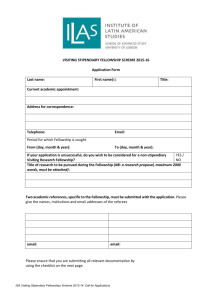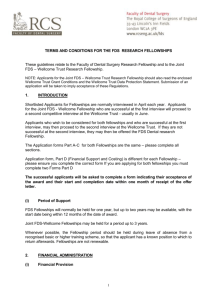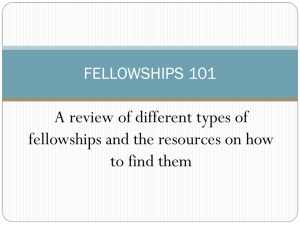Research Fellowship Awards
advertisement
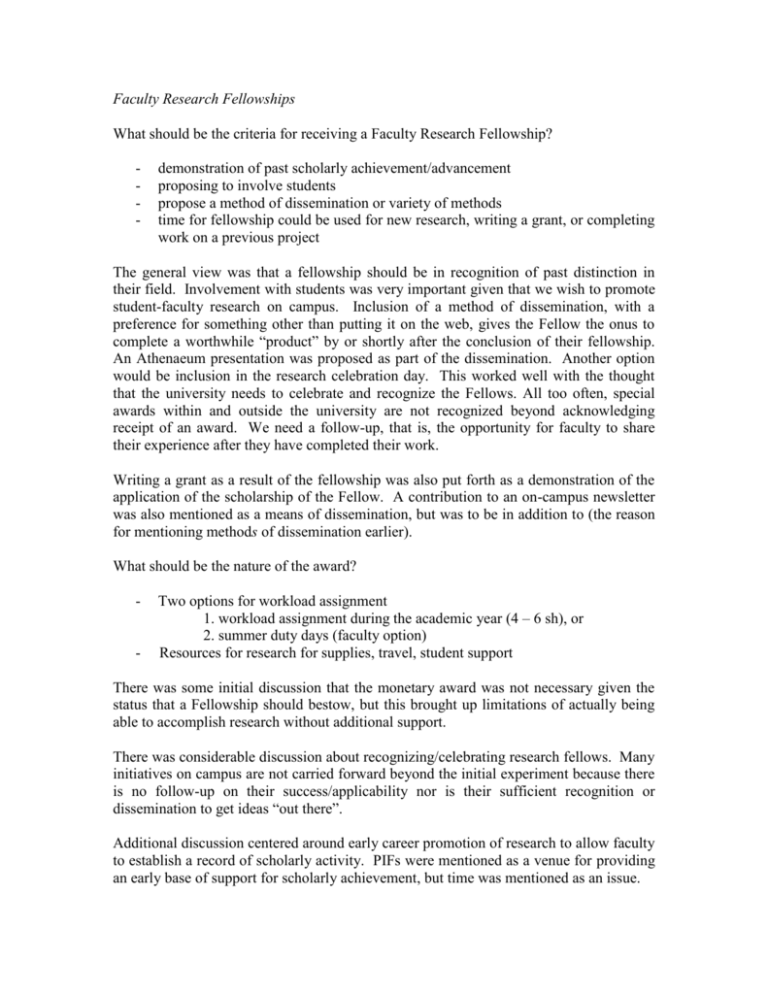
Faculty Research Fellowships What should be the criteria for receiving a Faculty Research Fellowship? - demonstration of past scholarly achievement/advancement proposing to involve students propose a method of dissemination or variety of methods time for fellowship could be used for new research, writing a grant, or completing work on a previous project The general view was that a fellowship should be in recognition of past distinction in their field. Involvement with students was very important given that we wish to promote student-faculty research on campus. Inclusion of a method of dissemination, with a preference for something other than putting it on the web, gives the Fellow the onus to complete a worthwhile “product” by or shortly after the conclusion of their fellowship. An Athenaeum presentation was proposed as part of the dissemination. Another option would be inclusion in the research celebration day. This worked well with the thought that the university needs to celebrate and recognize the Fellows. All too often, special awards within and outside the university are not recognized beyond acknowledging receipt of an award. We need a follow-up, that is, the opportunity for faculty to share their experience after they have completed their work. Writing a grant as a result of the fellowship was also put forth as a demonstration of the application of the scholarship of the Fellow. A contribution to an on-campus newsletter was also mentioned as a means of dissemination, but was to be in addition to (the reason for mentioning methods of dissemination earlier). What should be the nature of the award? - - Two options for workload assignment 1. workload assignment during the academic year (4 – 6 sh), or 2. summer duty days (faculty option) Resources for research for supplies, travel, student support There was some initial discussion that the monetary award was not necessary given the status that a Fellowship should bestow, but this brought up limitations of actually being able to accomplish research without additional support. There was considerable discussion about recognizing/celebrating research fellows. Many initiatives on campus are not carried forward beyond the initial experiment because there is no follow-up on their success/applicability nor is their sufficient recognition or dissemination to get ideas “out there”. Additional discussion centered around early career promotion of research to allow faculty to establish a record of scholarly activity. PIFs were mentioned as a venue for providing an early base of support for scholarly achievement, but time was mentioned as an issue. Application review – some level of peer-review was recommended in the determination of fellowship recipients. An all-university or faculty-administration committee might be the best vehicle for application evaluation as these groups can assess scholarship and fiscal components based on their respective expertise. Student Research Fellowships Qualifications – students that demonstrate an interest in research and the potential to excel in scholarly activities. Students should have a designated faculty mentor with a signature or letter from the mentor agreeing to assist and advise the student in their study. Students should include a statement of purpose and “doability” (access to more expensive materials and space) of their research. One possible consideration with student fellowships is that they be linked to faculty fellowships, either directly to the faculty fellow or students can apply for support to work with a faculty fellow. One advantage here is that resources from the faculty fellowship could be directed for needs other than student salary. Rather than salary students would receive course credit toward their major as the way of making time to do research (most departments have an independent study course or could use this as justification of proposing a research course).

